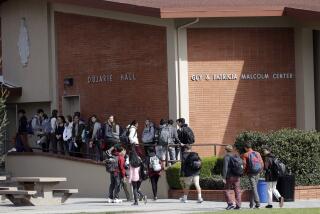Private school leaders sued for fraud after bankruptcy filing
Yu-Chen Lin first heard about the Montecito Fine Arts School on a Chinese language radio program. The owners promised a high-quality arts education that would help youths get into selective colleges and receive scholarships.
Lin, a single mother and Chinese immigrant, took her four children to visit the Monrovia campus in 2008. She said the owners convinced her to enroll all four and to pre-pay their tuition. That day, she wrote a check for more than $75,000.
But one year later, before her children had finished their classes, the school closed its doors and filed for bankruptcy. Lin said she believes the owners cheated her out of her only savings — money her parents had left for her children’s education.
“My children were hurt deeply,” she said, through an interpreter, at a news conference Tuesday. “Who else can we trust if even educators can do heartless things?”
Lin is one of 77 parents and students who filed a lawsuit Tuesday alleging that the schools’ president and vice president, Edgar Kuckelkorn and Trisha Ying Zi Zhang, defrauded families by taking their tuition money and failing to follow through on promises of classes, college counseling and internships. The lawsuit, filed in Los Angeles County Superior Court, said they aggressively marketed to Chinese immigrants who spoke limited English and had little knowledge of the American educational system.
Kuckelkorn and Zhang pressured families to pay tuition in advance and took advantage of parents’ desire to advance their children’s education, according to the lawsuit. The company, which ran the Montecito High School of Arts, the Montecito Fine Arts College of Design and the Montecito Fine Arts School, advertised in Chinese newspapers, radio and television, as well as Spanish-language radio. The schools offered classes in art, design and animation.
The company filed for bankruptcy in 2009 on behalf of the campuses in Arcadia, Brea and Monrovia. Bankruptcy attorney Majid Foroozandeh said the economic crisis caused a decline in enrollment and an increase in late tuition payments, prompting the bankruptcy filing.
“The schools went out of business simply for one reason and one reason only — because of the economic times,” he said in an interview. “Parents have a right to be upset.... But when there is no money, you have difficulty operating the school.”
Kuckelkorn could not be reached for comment.
The families are seeking restitution and an injunction to prevent the directors from perpetrating what their attorneys call unfair business practices.
Attorney Julie Su said this was a “concerted scam” and that the owners continued to enroll students and collect tuition even though they knew they were in financial trouble. Altogether, the families paid a total of $1.5 million in pre-paid tuition.
“They ran a well-orchestrated scheme that included false advertising, targeted recruiting, trumped-up bargains and promises of great benefits,” said Su, litigation director at the Asian Pacific American Legal Center. “The benefits never materialized.”
Another parent, Christine Jiang, from Taiwan, said she was attracted by promises of admission and scholarships to prestigious colleges, and she paid $20,000 for classes for her teenage sons. The directors, she said, “took advantage of our love for our children.”
Lin said the incident had left her angry and frustrated. “We have to voice our dismay against this type of corruption in order to prevent it from ever happening again,” she said.
More to Read
Sign up for Essential California
The most important California stories and recommendations in your inbox every morning.
You may occasionally receive promotional content from the Los Angeles Times.










